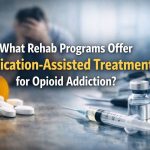Comprehensive Therapy for Substance Abuse and Mental Health
At Solutions Healthcare, we understand that addiction and mental health challenges often go hand in hand, impacting all areas of a person’s life. To address these complex issues, our comprehensive therapy programs are built on evidence-based approaches that provide clients with the most effective tools for recovery. By focusing on therapies backed by research, we ensure that every individual receives treatment tailored to their unique needs, giving them the best chance at long-term success.
The Importance of Evidence-Based Therapy in Addiction Treatment
Evidence-based therapy refers to treatment methods that have been scientifically tested and proven to be effective for individuals dealing with substance use disorders and mental health conditions. Unlike some alternative or unproven approaches, these therapies rely on clinically proven research and data, offering clients a higher likelihood of achieving lasting recovery.
At Solutions Healthcare, we use a variety of evidence-based therapies to address both substance abuse and co-occurring mental health issues. This comprehensive approach ensures that all aspects of the individual’s health are treated, providing a solid foundation for lifelong recovery.
Key Evidence-Based Therapies
Several therapies may be used in substance use disorder (SUD) treatment. Some of the most popular include:
1. Cognitive Behavioral Therapy (CBT)
Cognitive behavioral therapy (CBT) is one of the most widely used evidence-based approaches in addiction treatment. CBT focuses on identifying and changing the negative thought patterns and behaviors that contribute to substance use.
Many individuals struggling with addiction have developed harmful cognitive patterns that reinforce their drug or alcohol use, such as rationalizing unhealthy behaviors or feeling powerless to change. During CBT sessions, clients work with a therapist to recognize these thoughts and replace them with healthier, more productive ways of thinking.
By focusing on practical solutions, clients can develop coping skills that help them manage triggers, cravings, and emotional stressors without resorting to substance use. CBT sessions can be held in individual or group therapy formats. Cognitive behavioral family therapy may also be used.
2. Dialectical Behavior Therapy (DBT)
Dialectical behavior therapy (DBT) is another highly effective evidence-based treatment, particularly for individuals who struggle with emotional regulation and have a history of self-harm or suicidal behaviors. While DBT was originally developed to treat borderline personality disorder, it has proven to be an effective tool in addiction recovery as well.
DBT is a type of CBT that focuses on teaching clients how to tolerate distress, regulate their emotions, and improve interpersonal relationships. This is especially important for those dealing with substance use disorders, as emotional instability often contributes to relapse.
DBT combines individual therapy with group skills training, where clients learn mindfulness, emotional regulation, and distress tolerance. These skills help teach clients to cope with difficult situations in healthier ways, reducing the urge to turn to drugs or alcohol as a form of escape.
3. Motivational Interviewing (MI)
Motivational Interviewing (MI) is a collaborative, client-centered therapy designed to enhance an individual’s motivation to change for the better. Many people struggling with drug and alcohol addiction may feel ambivalent about seeking treatment or unsure about their ability to maintain sobriety. MI addresses this ambivalence by helping clients explore their own reasons for change, rather than relying on external pressure or judgment.
Through open-ended questions and empathetic listening, MI helps clients clarify their personal goals and resolve their doubts about recovery. This approach is particularly useful in the early stages of treatment, as it promotes a sense of independence and control over one’s recovery.
4. Trauma-Informed Therapy
For many individuals, trauma plays a significant role in the development of substance use disorders. Trauma-informed therapy recognizes the connection between past trauma and addiction, offering a compassionate and supportive environment where clients can process their experiences without fear of judgment.
At Solutions Healthcare, our trauma-informed approach is based on understanding, recognizing, and responding to the effects of trauma. This type of therapy helps clients develop a sense of safety and control, which is essential for their recovery.
By addressing unresolved trauma, trauma-informed therapy can help clients break free from the cycle of addiction and begin to heal on a deeper level. Techniques such as eye movement desensitization and reprocessing (EMDR) and trauma-focused CBT are often integrated into the treatment plan to help clients process and recover from past experiences.
5. Contingency Management (CM)
Contingency Management (CM) is an evidence-based intervention that uses positive reinforcement to encourage individuals to stay sober. In CM programs, clients receive tangible rewards for meeting certain milestones in their recovery, such as passing drug tests or attending therapy sessions for a certain amount of time.
The idea behind CM is that providing immediate and tangible rewards helps reinforce positive behaviors and can motivate clients to stick with their treatment plan in recovery. Research has shown that CM can significantly improve treatment outcomes, particularly in the early stages of recovery. It is often used alongside other types of treatment, such as CBT, DBT, or support groups like Alcoholics Anonymous (AA).
Benefits of Evidence-Based Therapy
The benefits of using evidence-based therapy in substance use disorder treatment include:
- Proven effectiveness – Therapies like CBT, DBT, and MI have been rigorously tested in clinical settings, ensuring that they produce reliable results for individuals struggling with addiction and mental health challenges.
- Personalized treatment – Evidence-based therapies can be tailored to the unique needs of each client, allowing for a more individualized approach to recovery. This increases the likelihood of success, as clients are treated based on their specific challenges and goals.
- Skill development – These therapies emphasize skill-building, equipping clients with the tools they need to manage triggers, cope with stress, and navigate life without relying on substances.
- Reduced risk of relapse – By addressing both the psychological and emotional aspects of addiction, evidence-based therapies reduce the likelihood of relapse. Clients learn how to manage cravings, identify high-risk situations, and develop healthier coping mechanisms.
The Role of Comprehensive Therapy in Long-Term Recovery
At Solutions Healthcare, our comprehensive approach combines evidence-based therapies with a focus on the individual’s overall well-being. We understand that addiction is a multifaceted issue that requires more than just symptom management—it requires addressing the root causes of substance use and mental health challenges.
Through our therapy programs, clients gain a deeper understanding of themselves, their behaviors, and the behavioral patterns that have kept them trapped in addiction. By helping our clients to develop healthier relationships, build emotional resilience, and take control of their recovery, we lay the foundation for lasting success without drugs and alcohol.
Take the First Step Toward Recovery
If you or a loved one is struggling with addiction or co-occurring mental health issues, Solutions Healthcare is here to help. Our evidence-based, comprehensive therapy programs are designed to provide you with the tools and support you need to achieve lasting recovery. Contact us today to learn more about our treatment options and get started with a confidential, risk-free assessment.




























